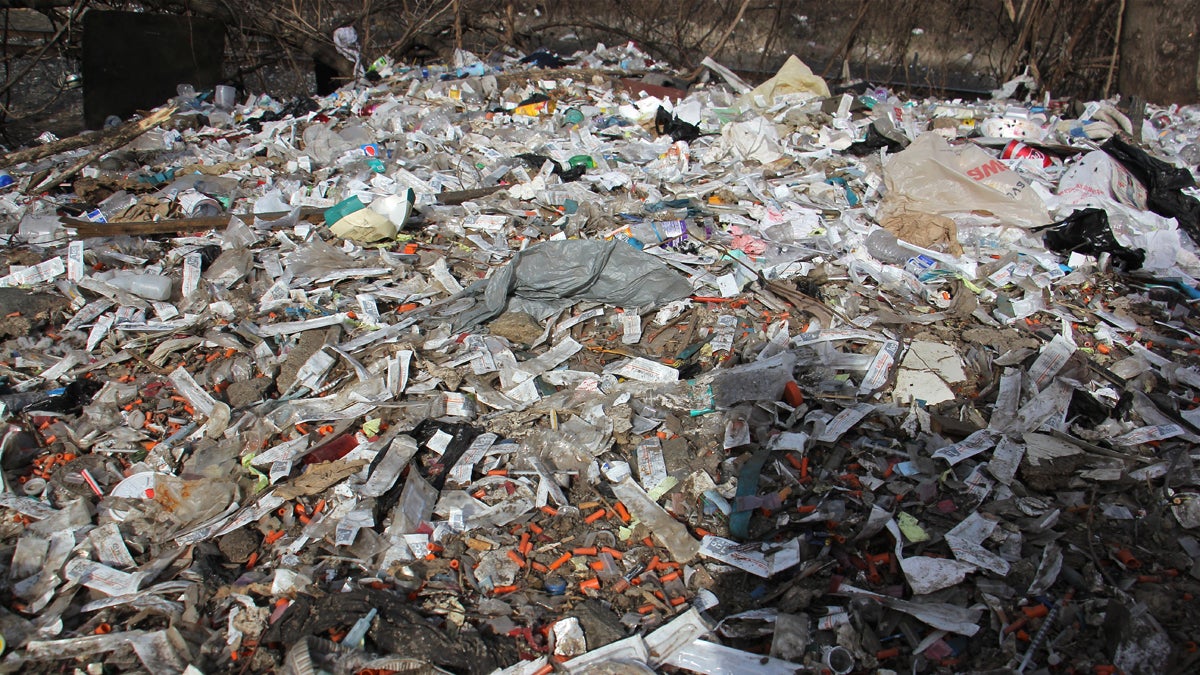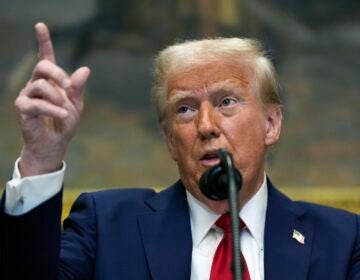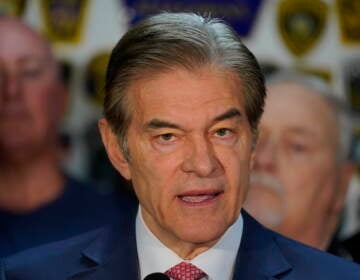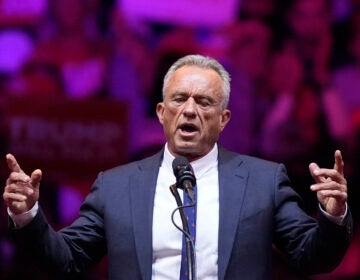Trump on the opioid crisis: Big talk, little action (big surprise)
We wonder what it will take to shake the faith of Trump's fans. His failure to tackle the opioid epidemic might conceivably dampen their ardor.

Heroin needles and trash litter the ground Conrail's railroad tracks in the Kensington neighborhood of Philadelphia (Emma Lee/WHYY)
We wonder what it will take to shake the faith of Trump’s fans. His subservience to Russia’s ongoing cyber-invasion? Nope. His relentless assaults on the integrity of our law enforcement and intelligence agencies? Nope. Shooting someone in broad daylight on Fifth Avenue? Probably nope.
But his failure to tackle the opioid epidemic — his big talk and dearth of meaningful action — might conceivably dampen their ardor.
This prescription drug plague has hit their world hard. More than 100 people die each day from opioid ODs; the victims are disproportionately young and middle-aged working-class men in small towns and rural communities — the heart of Trump’s constituency. The worst epidemic state is West Virginia, which Trump won by 43 points. He spoke to their despair when he promised to alleviate it. During the campaign he repeatedly referenced the opioid scourge: “If I win, I’m going to stop it …. We’re gonna spend the money. We’re gonna get that habit broken.”
And not long ago, as president, he vowed to cure the “worst drug crisis in American history” by declaring “a national emergency,” a legal designation that automatically frees up massive federal funds. He promised action that would be “really tough, really big, really great.”
He hasn’t done squat.
Big surprise, right? What else can we expect from a snake-oil salesman who sponsored a phony university and thinks he solved the non-existent “Merry Christmas” crisis? The story, in 2018, is whether Trump-lovers in those hard-hit communities will wake up to the realization that he hasn’t delivered on an issue they live with each day.
The evidence is already abundant, if they care to see it. The first warning sign came early in his tenure, when he and his Republican allies envisioned a federal budget that slashed Medicaid — which happens to be the most important source of federal funding for opioid addiction treatment. Medicaid covers roughly 30 percent of all non-elderly opioid addicts (including early intervention, overdose prevention, medication-assisted treatment), because money-strapped states can’t handle the load. Medicaid is crucial to the fight against opioids, but, to Republicans, it’s just an “entitlement.”
Opioid policy experts warn that the opioid epidemic will persist unless Trump and the congressional Republicans agree to spend an additional tens of billions each year. But there’s scant chance of that happening. Lest we forget, Trump just signed a tax bill that tilts financial benefits to the privileged; their welfare is deemed far more important than the addicted citizens in Trump communities. Worse yet, the tax bill will deepen the budget deficit by more than a trillion bucks — and in 2018, Paul Ryan plans to conveniently cite that deficit as the reason we need to slash spending. So Medicaid will be targeted anew.
As for the tens of billions of additional dollars for the opioid epidemic, dream on. Senate Democrats recently introduced a bill that would pony up $45 billion over the next 10 years (a modest amount, according to opioid experts), but Trump hasn’t lifted a finger to help it; neither, of course, have the congressional Republicans.
So what has Trump actually done? Like all politicians who do nothing, he marked time by appointing an opioid commission. Its report, released on Nov. 1, strongly urged Trump to declare a national emergency: “The time to wait is over. The time for talk has passed.” But Trump didn’t accept his commission’s advice. Instead, he declared a “public health” emergency.
The difference in wording is significant. A “national emergency” automatically triggers the release of federal money; the states can access the Disaster Relief Fund, just as they would after a hurricane. But a “public health” emergency is largely a rhetorical announcement; it doesn’t require that the states be given a cent. Another classic Trump scam.
But doesn’t he have a drug “czar” who can honcho this fight? Doesn’t the drug czar run the Office of National Drug Control Policy, which is lodged in the White House? Nope, Trump has no such person. In fact, he’s been trying to eviscerate the drug policy office. Trump did try to name a drug czar back in October, but his preferred choice, Pennsylvania congressman Tom Marino, was a drug industry toady who’d worked for years to undercut federal efforts to fight the opioid crisis. Marino withdrew his name, and the drug office has been rudderless since.
Need more evidence that Trump’s professed concern about the crisis is just another con? His big move was to name a “coordinator” who is supposedly goading the various agencies to work together. The “coordinator” is Kellyanne Conway, who apparently is deemed qualified to tackle opioids based on her long TV track record of lying and jabbering.
So is it conceivable that Trump voters in affected communities, seeing no progress in 2018, will finally wise up and admit that his rhetoric (“We can be the generation that ends the opioid epidemic”) is emptier than the whizbang bluster orchestrated by the Wizard of Oz? And will Democrats be smart enough to link the inaction to his cons and his congressional Republican Scrooges?
Write your own punchline.
WHYY is your source for fact-based, in-depth journalism and information. As a nonprofit organization, we rely on financial support from readers like you. Please give today.




